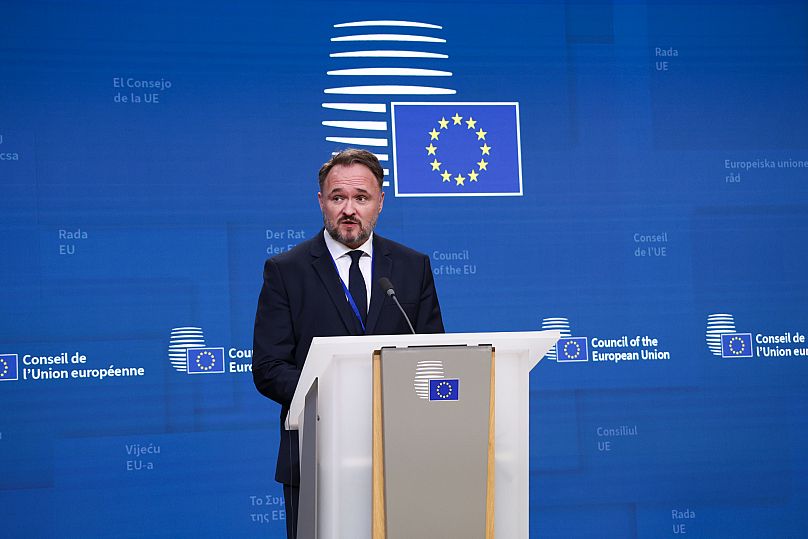The new package of EU sanctions on Russia contains the first-ever ban on imports of liquefied natural gas. "This will make this phase out of Russian gas in Europe much faster," Commissioner Dan Jørgensen told Euronews.
After more than three and a half years of brutal war in Ukraine, the European Union has broken a long-held taboo: sanctions on Russian gas.
The bloc has long applied sanctions, which require the unanimous approval of all 27 member states, to imports of Russian oil and coal, but has left Russian gas untouched, causing dismay among Kyiv and Eastern European countries.
The thinking changed on Friday, when the European Commission proposed, for the first time, applying sanctions on Russian gas, specifically liquefied natural gas (LNG), which today continues to flow into Belgium, the Netherlands, France, Spain and Portugal.
"So far we have not had sanctions on buying gas from Russia, and this will now change," Dan Jørgensen, the European Commissioner for Energy, told Euronews in an interview.
"The situation is so serious. Putin is refusing to go to the negotiation table. We have Russian drones over member state territory and this, of course, will not stand. It has to have consequences, and this is why we are taking this step."
The Commission previously presented an ambitious roadmap to eliminate all purchases of Russian fossil fuels by the end of 2027 at the latest.
But amid heavy pressure from Donald Trump, who has urged Europeans to cut all energy ties with Moscow, Brussels has taken a step to speed things up. If approved, the package will bring the end of Russian LNG one year earlier to 1 January 2027.
In parallel, Jørgensen explained, legislative work will continue to complete the phase-out, which will gradually remove all purchases of Russian pipeline gas and nuclear fuels.
Last year, the bloc spent an estimated €21.9 billion on Russian energy.
"The bottom line is this will make this phase out of Russian gas in Europe much faster," Jørgensen told Euronews.
While the roadmap, which is trade policy, requires a qualified majority to be approved, the new ban on Russian LNG, which is a sanction, needs unanimous support.
This means that individual governments will be able to derail the measures.
Tough negotiations
All eyes will be on Hungary and Slovakia, which have a long track record of vetoes. The two landlocked countries do not buy Russian LNG but still receive Russian oil through the Druzbha pipeline and Russian gas through the TurkStream pipeline.
Hungary and Slovakia have mounted an opposition campaign against the phase-out of Russian energy, claiming it would endanger national security, raise prices for consumers and prompt multi-billion-euro lawsuits in compensation.
Jørgensen, who has been in touch with both countries to address their concerns, expressed his hope that the ban on Russian LNG would go through.
"I very much hope that all countries in Europe will agree that the situation is even more serious than it has been before and that we really do need to act," he said.
"We've done a lot to make sure that no country, including Hungary or Slovakia, will face problems with security of supply or spikes in prices because we've diversified where we get our gas from, and we are ready and willing and able to do that even more so."
The Commissioner confirmed that the latest sanctions package would not revisit the legal carve-out that has allowed Hungary and Slovakia to obtain crude from the Druzbha pipeline, which Ukraine attacked in August to cripple the Kremlin's war chest.
The exemption was granted in mid-2022 amid tense negotiations. Although leaders promised to take a second look down the road, it has remained untouched.
Jørgensen said the phase-out would eventually close the loophole.
"This package is a package that focuses on LNG. And this is new, this is a step forward and a bigger pressure that we put on Russia," he said.
"And with regards to the oil, we already do have sanctions. Two countries have derogations that will still be there," he added.
"But there's also a circumvention of the sanctions, unfortunately, taking place via the 'shadow fleet' of Russia. And the sanctions will also hit them much harder."
Last year, the bloc bought 20.05 billion cubic metres (bcm) of Russian LNG and 31.62 bcm of Russian pipeline gas, representing 19% of total gas consumption.
The bloc has shifted heavily to US-made LNG, leading critics to warn that the historic dependency on Russian energy is being replaced with an American version.












